University of Southern California Admissions Profile
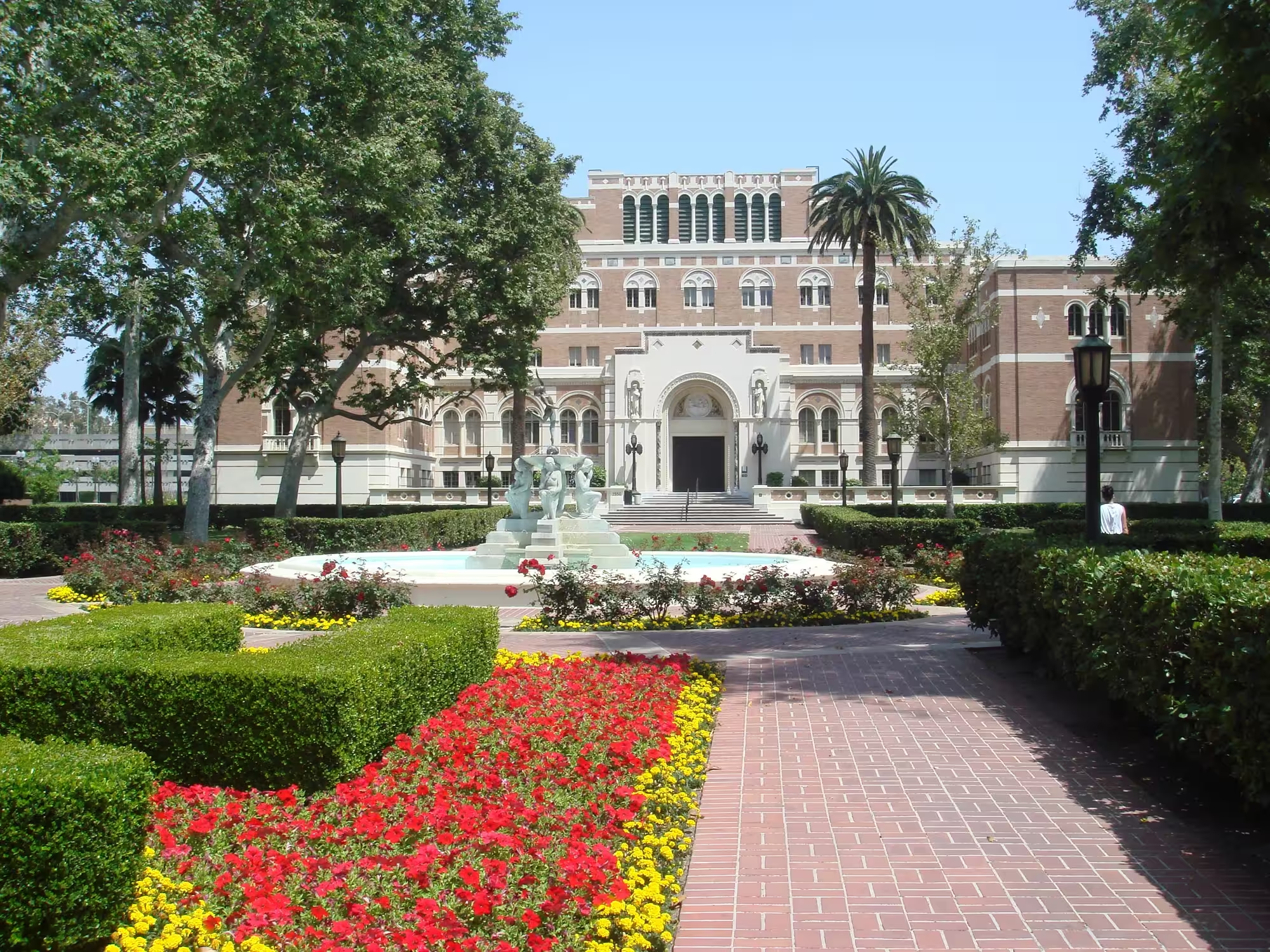
Introduction
Welcome to our comprehensive guide on the University of Southern California admissions profile. If you're considering applying to the University of Southern California (USC), this article will provide you with all the essential information you need to know. From admission requirements to the application process, scholarships, and campus life, we've got you covered. Let's dive in and explore what makes USC such a prestigious institution.
University of Southern California Admissions Profile
The University of Southern California is a world-renowned private research university located in Los Angeles, California. Founded in 1880, USC has a rich history of academic excellence and a strong reputation for its diverse and vibrant campus community. With top-ranked programs and a commitment to innovation, USC offers a wide range of opportunities for students to excel in their chosen fields.
Below are tables highlighting how USC evaluates each applicant through information published in the Common Data Set, a resource that compiles a standardized list of data items provided by universities about their admissions profiles.
Distribution of high school units required and/or recommended

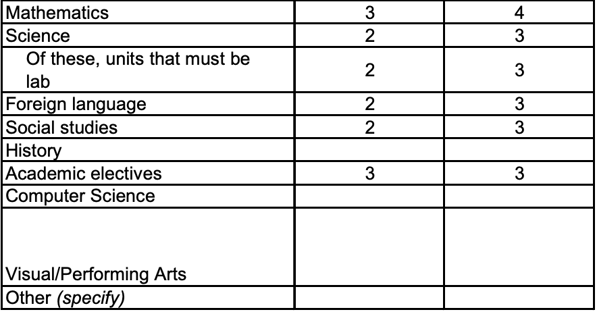
Relative importance of each of the following academic and nonacademic factors in your application
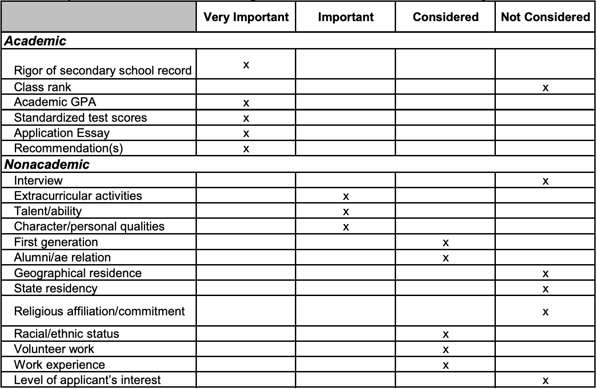
SAT and ACT Policies
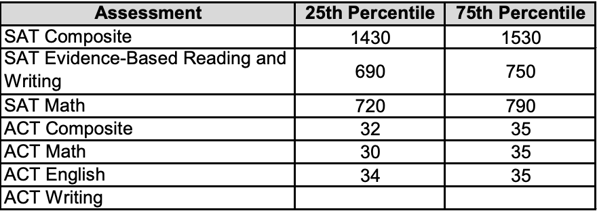
Admissions Requirements
To gain admission to the University of Southern California, applicants must meet certain requirements. Here are the key factors considered during the admissions process:
-
Academic Excellence: USC seeks students who have demonstrated strong academic performance throughout their high school years. This includes a challenging curriculum, high grades, and impressive standardized test scores.
-
Standardized Test Scores: While USC takes a holistic approach to admissions, SAT or ACT scores play a significant role. It's recommended that applicants aim for scores within or above the middle 50% range of admitted students.
-
Transcripts and Coursework: Admissions officers review applicants' high school transcripts to assess their course rigor and academic achievements. Taking advanced courses, such as Advanced Placement (AP) or International Baccalaureate (IB), can enhance your application.
-
Extracurricular Involvement: USC values students who have engaged in extracurricular activities, such as clubs, sports, community service, leadership roles, or artistic pursuits. Highlighting your passions and achievements outside the classroom can strengthen your application.
The Application Process
Applying to USC involves several steps, and it's important to stay organized throughout the process. Let's walk through each stage of the application process:
1. Common Application
USC accepts the Common Application, which allows you to apply to multiple universities simultaneously. Complete the application form accurately, including personal information, academic history, and extracurricular involvement.
2. Supplemental Essays
As part of the application process, the University of Southern California (USC) requires applicants to complete supplemental essays. These essays provide an opportunity for applicants to showcase their unique qualities, experiences, and aspirations beyond what is captured in their general application. Let's explore the supplemental essays required by USC:
Essay Prompt 1: Describe how you plan to pursue your academic interests at USC. Please feel free to address your first- and second-choice major selections. (250 words maximum)
This prompt invites applicants to discuss their academic interests and how they plan to pursue those interests at USC. Applicants should articulate their passion for specific academic areas and demonstrate their understanding of the academic programs offered at USC. It is important to highlight how USC's academic resources, faculty, and opportunities align with their academic goals and intellectual pursuits.
Essay Prompt 2: USC believes that one learns best when interacting with people of different backgrounds, experiences, and perspectives. Tell us about a time you were exposed to a new idea or when your beliefs were challenged by another point of view. (250 words maximum)
Through this prompt, USC aims to understand how applicants engage with diverse perspectives and how they respond when their own beliefs are challenged. Applicants should provide a specific example that showcases their ability to listen, learn, and grow when confronted with differing viewpoints. It is important to reflect on the impact of the experience and the lessons learned from engaging with diverse ideas.
Essay Prompt 3 (Optional): USC faculty place an emphasis on interdisciplinary academic opportunities. Describe something outside of your intended academic focus about which you are interested in learning. (250 words maximum)
This optional prompt allows applicants to explore their intellectual curiosity beyond their intended academic focus. Applicants can discuss a subject or field they are interested in learning about, even if it falls outside their primary area of study. It is essential to explain the reasons for their interest, how it connects to their broader academic and personal goals, and how pursuing interdisciplinary opportunities at USC can enhance their educational experience.
Applicants should approach these supplemental essays with sincerity, thoughtfulness, and clarity. It is important to utilize the word limit effectively and provide specific examples that highlight the applicant's unique experiences, perspectives, and fit with USC's diverse and vibrant community. By doing so, applicants can strengthen their application and demonstrate their potential contributions to the University of Southern California.
Sample Essays
Prompt: Describe how you plan to pursue your academic interests and why you want to explore them at USC specifically. Please feel free to address your first- and second-choice major selections
Answer:
Ever since my parents bought me my first computer at the age of 6, I’ve been fascinated by what happens inside these machines. That’s why I want to be a computer programmer – to understand the inner world of computers.
My journey into coding started when I realized I could write programs to make the device perform tasks I wanted done. Soon, I was reading every single book I could get my hands on about programming and spent my days watching YouTube videos about writing machine-level code.
Within two years, I’d become the go-to kid in my high school regarding computer issues. Topics like new gadgets and software releases were all I was interested in.
I want to build on my self-developed knowledge by attending the Computer Science program here at USC. The university’s well-known for its research in this field. I want to understand the inner logic of computers and USC will help me plant deep roots in science – I want to possess in-depth knowledge and understanding behind the 0’s and 1’s.
USC also offers a chance for students to delve into the entrepreneurial aspects of Computer Science. I intend to pursue these classes to gain knowledge on how to use my education to create the applications of the future – for my own and the public’s welfare.
Electronics, my second-choice major, will also help me achieve the same goals, albeit with a slightly different approach. Studying the underlying technology will give me a deeper insight into realizing my digital dreams.
Prompt: USC believes that one learns best when interacting with people of different backgrounds, experiences, and perspectives. Tell us about a time when you were exposed to a new idea or when your beliefs were challenged by another point of view. Please discuss the significance of the experience and its effect on you.
Answer:
Although we had a relatively comfortable life in Zimbabwe, my parents were never in no doubt that the “Evil West” had it in for our country.
As the sanctions, and ensuing protests against the government grew, we found ourselves in a rapidly deteriorating situation. First, it was cutting back on “luxuries” like eating out and weekly family movie nights at the cinema. We then had to sell the car and finally, we were sure we were going to lose the house.
All the while, the government was broadcasting how it was all the fault of the West.
Needless to say, when we got the chance to immigrate, it was with apprehension that we landed at the airport. We half-expected to be thrown into prison for simply being Zimbabweans. Even after the officer stamped our passports and welcomed us into the country, we still expected that there was something bad to happen – it was just a matter of time.
We’ve been in this country for over seven years now.
We no longer walk with fear. The love and freedom we see all around is still a novelty that hasn’t worn off. The “West” we thought was going to be the end of us has given us a new lease on life.
And it was only when we were here after we had crossed over to the other side that we could see where the evil lay.
Prompt: Starting with the beginning of high school/secondary school, if you have had a gap where you were not enrolled in school during a fall or spring term, please address this gap in your educational history. You do not need to address a summer break
Answer:
I took a semester off in the 11th grade to help my dad on our farm. We’ve had that farm for four generations. It was the family’s pride and we’d never faced a time when we were in danger of losing it.
When I was 16, three consecutive droughts had left the land barren. All the feed that we had in stock was running out fast. We’d managed to bring the number of cattle down to an affordable range by selling what we could, and the feed was being rationed at a very careful rate.
Whenever we could, we would buy feed from other states where the rains hadn’t been as scarce. In solidarity with their less fortunate comrades, the farmers in the East – who had better rainfall – sold the feed at affordable prices. Until the drought hit them too. And even as we watched each kilo of feed, the rat infestation started. That’s when my father called for all hands on deck.
What did I do during my gap? I spent every day killing an invasion of rats. We had an inspection around the feed store and sealed every possible hole and crack we could find. Traps were set and strictly monitored to make sure they were back in service in the shortest possible time.
Once the rats were gone, I managed to get catch up on my coursework with the help of my teachers, tutors, and my classmates who were all happy to get me all caught up.
3. Letters of Recommendation
USC typically requires two letters of recommendation from teachers or other individuals who can speak to your academic abilities, personal character, and potential for success at the university. Choose recommenders who know you well and can provide detailed insights about your strengths.
4. Standardized Test Scores
Official SAT or ACT scores must be sent directly to USC from the testing agency. USC operates under a test-optional policy, meaning that submitting test scores is not required for most undergraduate applicants. However, strong scores can still enhance your application.
5. Artistic or Athletic Supplements
If you have exceptional talent in the arts or athletics, USC encourages you to submit supplementary materials showcasing your abilities. This could include portfolios, audition recordings, or athletic achievements.
6. Application Fee or Fee Waiver
There is an application fee to submit your application to USC. However, fee waivers are available for eligible students who demonstrate financial need. Check the USC admissions website for specific details and instructions on obtaining a fee waiver.
7. Deadlines
When applying to the University of Southern California (USC), it is important to keep track of the specific application deadlines. USC offers different application options, including Early Decision, Regular Decision, and Transfer Admission. Understanding these deadlines will help prospective students plan their application timeline effectively.
Early Decision (ED)
USC offers an Early Decision program that is binding, meaning that if admitted, students are obligated to enroll. The Early Decision deadline is typically in early November, and applicants will receive their admission decision by mid-December. Early Decision is an option for students who have identified USC as their top-choice institution and are committed to attending if admitted.
Regular Decision (RD)
The Regular Decision deadline for USC is typically in early January. By applying Regular Decision, students have more time to prepare their application materials and explore their options before making a final decision. Admission decisions for Regular Decision applicants are usually released by late March or early April.
Transfer Admission
For students seeking to transfer to USC, the application deadline is typically in early February. Transfer students are required to submit their applications and supporting materials by this deadline to be considered for admission.
It's important to note that USC has a holistic admissions process, which means that they consider various factors beyond academic achievements, such as extracurricular involvement, leadership experiences, essays, and letters of recommendation. Prospective students should ensure that all application materials are submitted by the specified deadlines to ensure a complete and timely application.
By understanding and adhering to these deadlines, prospective students can strategically plan their application timeline, ensuring they have enough time to present their best selves in the USC admissions process. Meeting the application deadlines increases the chances of being considered for admission to the University of Southern California, a renowned institution known for its academic excellence and diverse community.
Scholarships and Financial Aid
USC is committed to making education accessible to students from diverse backgrounds. The university offers various scholarships and financial aid options to help make education affordable. Here are a few examples:
-
Merit Scholarships: USC awards a range of merit-based scholarships to outstanding incoming students. These scholarships are based on academic achievements, leadership qualities, artistic talent, or community involvement. Some scholarships are automatically considered during the admissions process, while others require separate applications.
-
Need-Based Financial Aid: USC provides need-based financial aid to eligible students. By submitting the Free Application for Federal Student Aid (FAFSA) and the CSS Profile, students can be considered for grants, loans, and work-study programs.
-
Specialized Scholarships: USC offers a variety of scholarships for specific programs, such as the Trustee Scholarship, Presidential Scholarship, and the Mork Family Scholarship. These scholarships often cover a significant portion of tuition costs and provide additional support for academic and personal development.
Campus Life and Resources
USC offers a vibrant campus life with a range of resources and opportunities to enhance the student experience. Here are some highlights:
-
Residential Life: USC provides a variety of housing options for students, including traditional residence halls and themed communities. Living on campus allows students to immerse themselves in the USC community, develop lifelong friendships, and engage in various activities and events.
-
Student Organizations: With over 1,000 student organizations, USC offers a diverse range of clubs and groups catering to various interests and passions. Whether you're interested in cultural organizations, academic clubs, community service, or sports, there is something for everyone.
-
Internship and Career Services: USC has a robust career center that offers career counseling, internship opportunities, resume workshops, and networking events. The university's strong connections with industries and employers in Los Angeles provide valuable opportunities for students to gain real-world experience.
-
Academic Support: USC provides academic support services, including tutoring, writing centers, and academic advising. These resources are designed to help students excel academically and reach their full potential.
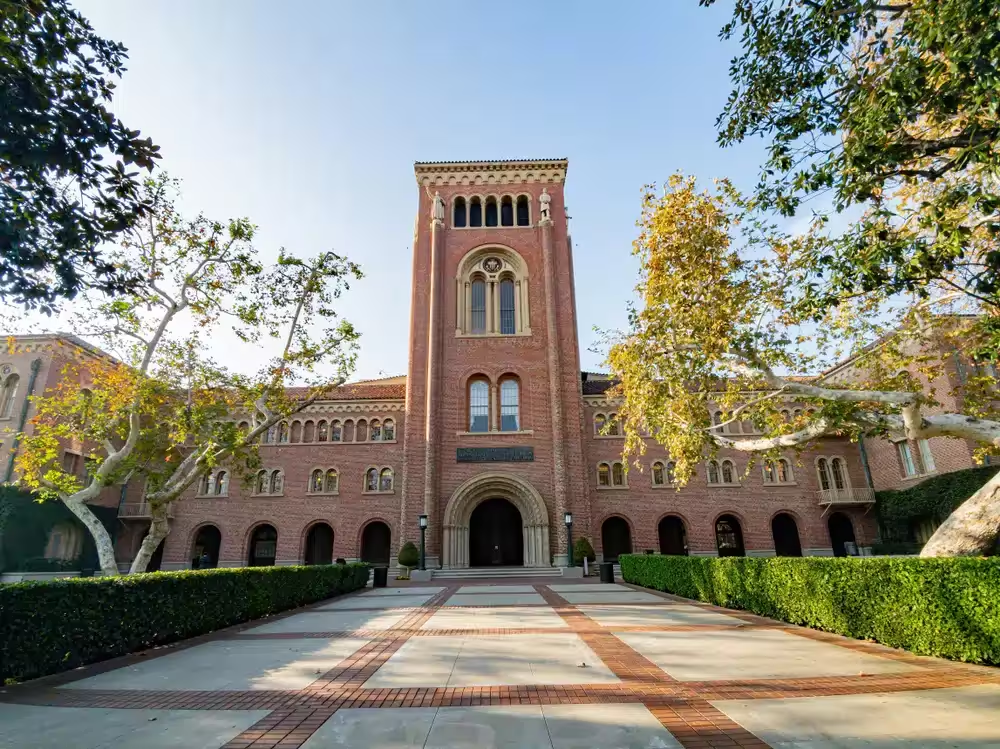
Frequently Asked Questions
What is the acceptance rate at USC?
The acceptance rate for USC varies each year, but it is typically highly competitive, with an average acceptance rate of around 11-13%.
Are interviews required for admission to USC?
What majors and programs are offered at USC?
USC offers a wide range of undergraduate and graduate programs across various disciplines, including but not limited to business, engineering, arts and sciences, cinematic arts, journalism, architecture, and performing arts.
Conclusion
The University of Southern California offers a transformative educational experience and countless opportunities for students to pursue their passions and unlock their potential. By understanding the USC admissions profile, you can navigate the application process with confidence. Best of luck as you embark on this exciting journey toward a future filled with possibilities!

